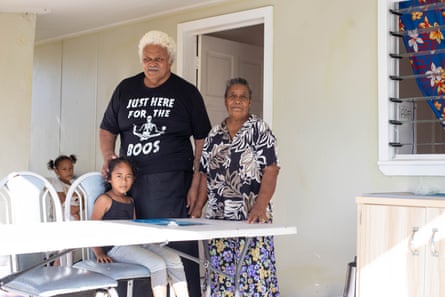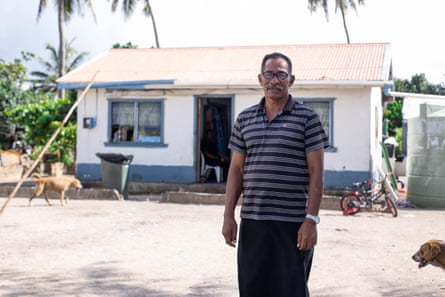When Eleni Via, 67, lived on Atata Island, her family was able to subsist on land and sea, surviving on crops grown in their garden and seafood fresh from the ocean.
But in the past year, life has changed dramatically. Now, they are struggling in a new home, trying to farm a land that isn’t as fertile as it should be. For the first time in her life, Fia has to think of ways to pay the water and electricity bill, while making ends meet. In Atata they can rely on fishing to provide basic necessities and income. In her new home on the country’s main island, Tongatapu, she wakes up every day wondering how she will provide for her family.
Like many Tongans, Via’s life was turned upside down on January 15, 2022, when the Hong Tongan volcano – Hong Haapai erupted. Satellite images showing the astonishing scale of the eruption were broadcast around the world, but when the world’s eyes turned to Tonga, the country vanished. Damage to the submarine cable powering Tonga’s internet and much of its telecoms infrastructure meant that for days, the scale of the disaster was unknown.
When the government was finally able to deliver a statement, the news was devastating: the explosion triggered a tsunami that swamped a number of the country’s islands. 84% of Tonga’s population was affected by the tsunami or volcanic ash.
Residents who lost their homes were relocated to the main island of Tongatapu. The government described it as an “unprecedented disaster”. The World Bank estimated the cost at US$90.4 million – equivalent to 18.5% of Tonga’s GDP – and most of this cost comes from resettling and rebuilding villages affected by the tsunami.

Atata was among the hardest hit. The damage to the island was described by the New Zealand Defense Force as “catastrophic” and a United Nations assessment found that dozens of structures had been damaged while the entire island was covered in ash.
A year later, Via, along with her husband, Ma’uhe’ofa Via, and her granddaughter, Tu’aloa, finally left the home of relatives they had been staying with since the tsunami, and moved into a new homes settlement in Masilamea village in Tongatapu.
“We are so glad we settled here. Our home on the island was destroyed. We are grateful to [what] Via says.
The house has one bedroom, a bathroom, a toilet and a veranda where all the food is eaten and the food is cooked on the fire outside. They have few utensils and dishes. He longed for a kitchen to make food and a place to store.
Housing remains an issue across the country, after many homes were damaged or destroyed by the tsunami.
On the other side of the island, in the village of Batangata, lives Moses Sekolo Maffei, 61. His family lives opposite the sea and witnessed first-hand the devastation left by the tsunami.
Despite the widespread destruction, only six new homes were built in his community. The government has promised ten people, but even that will not be enough, according to Maffei.
Nowadays, there are a lot of houses that need to be rebuilt. The problem is that there is no equal distribution and the surveys that are taken do not reflect the reality of living conditions.”

It is suggested that in order to protect people from another tsunami, the foreshore should be built higher and provide another emergency exit.
“Right now the only way out of Batangata is by the ocean road and we hope to have a back road that takes us straight inland in case of future tsunami emergencies.”
Maffy is still grateful though – his family still has the ocean at their disposal, which produces the fish and seafood they sell on the side of the road. Despite the devastation, no members of his community were killed in the tsunami.
“I’m just as grateful for what happened during the day as if it happened at night, there would have been a lot more infant deaths,” he says.
“We lost everything. I don’t think anyone survived the wrath of the tsunami.”
Few can escape their memories either. The last time there was an earthquake, Maffei says, the national tsunami siren went off and everyone ran inside.
Many children were particularly affected. Fia’s granddaughter is only five years old, but she lives in fear that a tsunami could strike again at any moment.
“When lightning and thunder happen, or when there are strong winds and heavy rains, you turn to me, ‘Will there be another tsunami?'” “I tell her: No. It’s just rain and strong winds.”
Meanwhile, says Villa, “we place our trust in God again.”

“Lifelong food lover. Avid beeraholic. Zombie fanatic. Passionate travel practitioner.”
